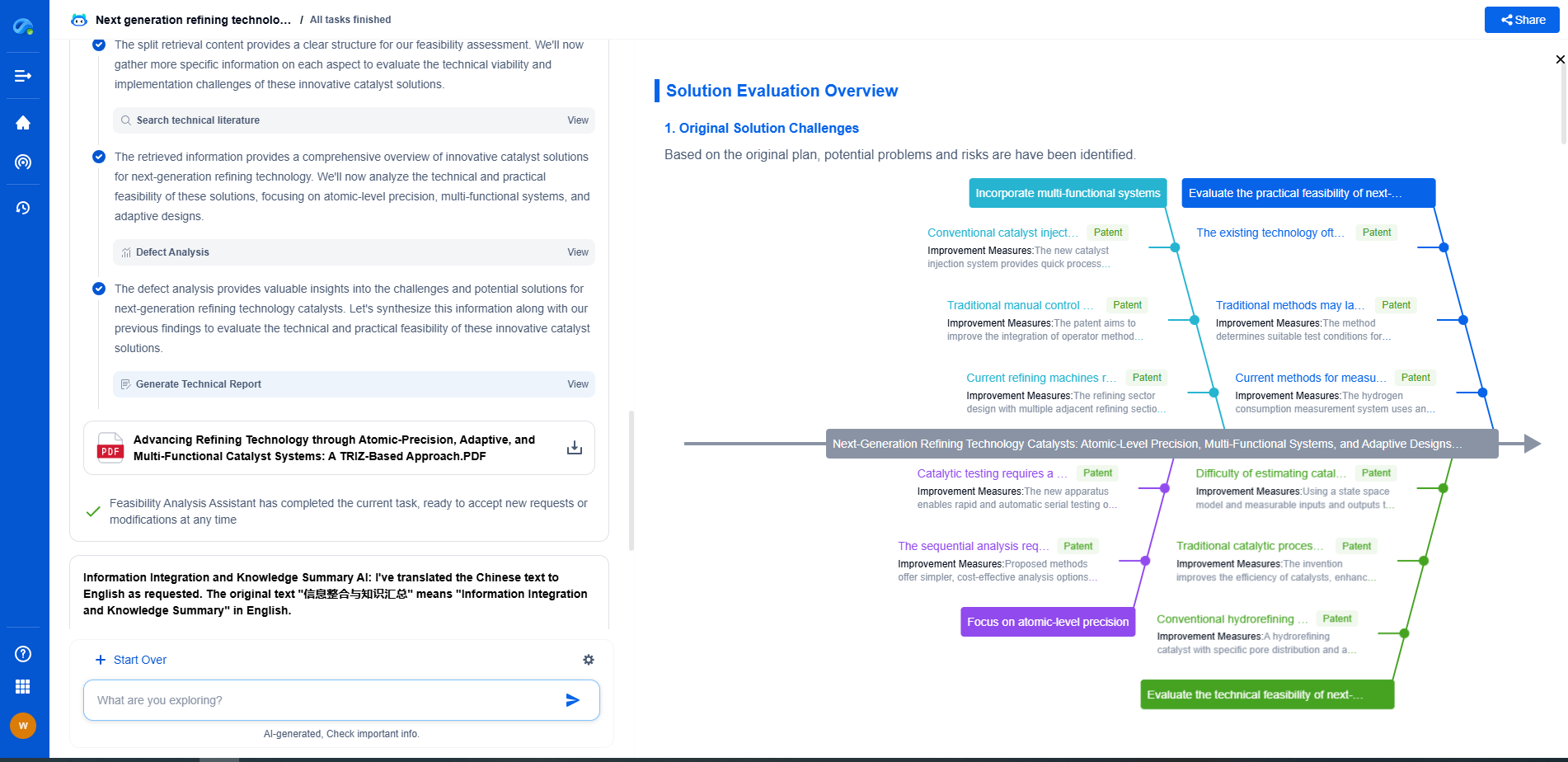Thermal Stability of Various Capacitor Types Under High Load
JUL 9, 2025 |
Capacitors are integral components in electronic circuits, often used to store and release electrical energy. However, their performance can be significantly influenced by thermal conditions, especially under high load. Understanding the thermal stability of various capacitor types is crucial for ensuring reliability and efficiency in electronic applications.
The Importance of Thermal Stability
Thermal stability refers to a capacitor's ability to maintain its performance characteristics and structural integrity when exposed to elevated temperatures. When capacitors operate under high load, they generate heat due to internal resistance and dielectric losses. If a capacitor cannot dissipate this heat effectively, it may lead to overheating, affecting its capacitance, insulation resistance, and lifespan. In severe cases, thermal instability can lead to catastrophic failures like dielectric breakdown or explosion.
Types of Capacitors and Their Thermal Characteristics
Different types of capacitors offer varying degrees of thermal stability, influenced by their construction materials and design. Here, we explore some common types of capacitors and assess their thermal performance under high load conditions:
1. **Ceramic Capacitors**
Ceramic capacitors are widely used due to their small size and low cost. They are known for their good thermal stability and can operate at high temperatures, typically up to 125°C. However, their thermal performance can degrade as the dielectric material in ceramic capacitors is sensitive to temperature changes, which can alter the capacitance value. This makes them less suitable for applications requiring high thermal stability.
2. **Electrolytic Capacitors**
These capacitors are often used in power supply circuits due to their high capacitance and voltage ratings. Electrolytic capacitors have a moderate thermal stability, generally operating up to 105°C. Their main limitation is the liquid electrolyte, which can evaporate at high temperatures, leading to a decrease in capacitance and potential leakage or failure. Recent advancements have produced solid-state electrolytic capacitors with improved thermal performance.
3. **Film Capacitors**
Film capacitors, particularly polypropylene and polyester types, offer excellent thermal stability due to their solid dielectric material. They can sustain high voltages and temperatures up to 150°C with minimal change in performance. Their thermal stability makes them ideal for applications requiring high precision and reliability under variable load conditions.
4. **Tantalum Capacitors**
Tantalum capacitors are known for their high capacitance per volume and stability over time. They possess good thermal stability, typically operating up to 125°C. However, they are susceptible to thermal runaway if subjected to overvoltage or high ripple currents, which can lead to dramatic failures. Proper thermal management is essential to prevent such occurrences.
Factors Affecting Thermal Stability
Several factors influence the thermal stability of capacitors under high load:
- **Dielectric Material**: The type of dielectric material significantly impacts thermal performance. Materials with high thermal conductivity and low loss tangents are preferred for better thermal management.
- **Construction Design**: Capacitors with robust construction and adequate spacing between layers can dissipate heat more efficiently, enhancing thermal stability.
- **Operating Environment**: Ambient temperature, humidity, and airflow can affect a capacitor's ability to dissipate heat. Effective cooling mechanisms such as heat sinks or forced ventilation can enhance thermal stability.
Enhancing Thermal Stability
To improve thermal stability, manufacturers and engineers can adopt several strategies:
- **Material Innovation**: Developing new dielectric materials with superior thermal properties can enhance capacitor performance.
- **Design Optimization**: Optimizing the physical design of capacitors to improve heat dissipation can prevent overheating.
- **Thermal Management**: Implementing effective thermal management techniques such as heat sinks, fans, or thermal conductive materials can mitigate the risks of thermal failure.
Conclusion
Ensuring the thermal stability of capacitors under high load is essential for the reliability and longevity of electronic systems. By understanding the thermal characteristics of different capacitor types and employing effective thermal management strategies, engineers can design more robust and efficient electronic circuits. As technology advances, continued research and development in capacitor materials and designs will further enhance their thermal performance, meeting the demands of increasingly sophisticated applications.
Looking to accelerate your capacitor innovation pipeline?
As capacitor technologies evolve—from miniaturized MLCCs for smartphones to grid-scale energy storage devices—so must the way your team accesses critical knowledge.
Patsnap Eureka, our intelligent AI assistant built for R&D professionals in high-tech sectors, empowers you with real-time expert-level analysis, technology roadmap exploration, and strategic mapping of core patents—all within a seamless, user-friendly interface.
Try Patsnap Eureka now and discover a faster, smarter way to research and innovate in capacitor technology.
- R&D
- Intellectual Property
- Life Sciences
- Materials
- Tech Scout
- Unparalleled Data Quality
- Higher Quality Content
- 60% Fewer Hallucinations
Browse by: Latest US Patents, China's latest patents, Technical Efficacy Thesaurus, Application Domain, Technology Topic, Popular Technical Reports.
© 2025 PatSnap. All rights reserved.Legal|Privacy policy|Modern Slavery Act Transparency Statement|Sitemap|About US| Contact US: help@patsnap.com

